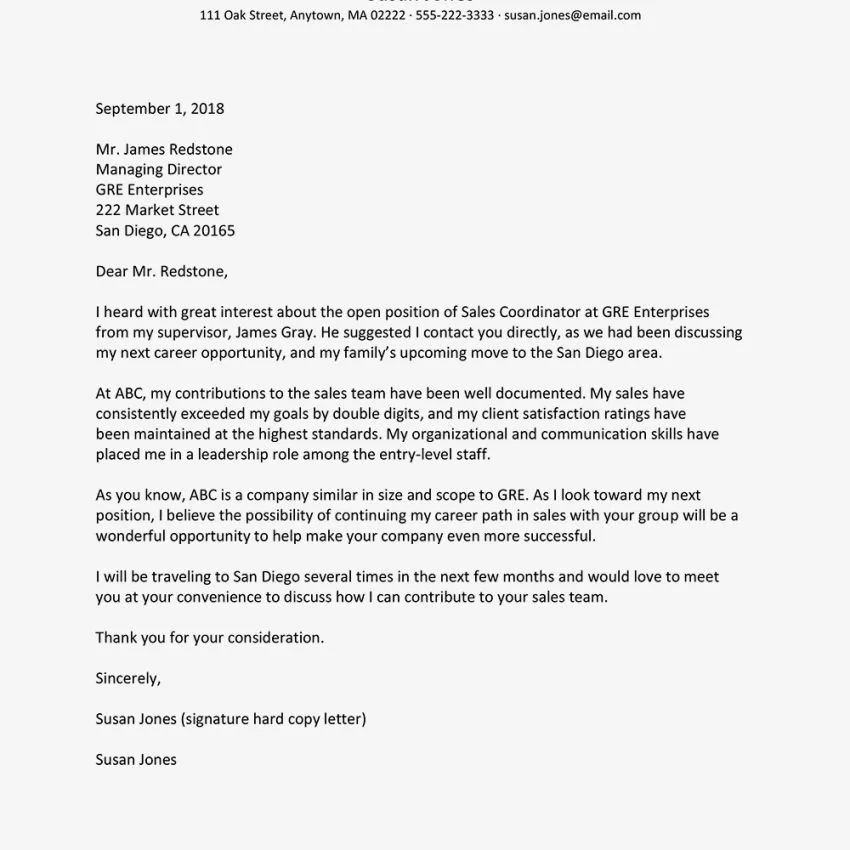Understanding the Relocating Cover Letter
A relocating cover letter is a specialized document accompanying your resume when you’re applying for jobs in a new location. It serves as your introduction to a potential employer, highlighting your skills and qualifications while explicitly addressing your plans to relocate. Unlike a standard cover letter, it directly tackles the employer’s potential concerns about your move, such as its timing and your commitment to the role. Successfully navigating the nuances of a relocating cover letter can significantly boost your chances of securing an interview and ultimately, the job. The goal is to demonstrate your enthusiasm for the opportunity and your preparedness for the logistical challenges of relocating.
Why a Relocating Cover Letter is Crucial
A well-crafted relocating cover letter is essential because it proactively addresses the elephant in the room: your move. Employers often hesitate to consider candidates who are not local, fearing the costs and uncertainties associated with relocation. This letter reassures them. It demonstrates your genuine interest in the position and your willingness to make the move, which makes you stand out from other applicants who might be local. Without it, your application could be overlooked. Moreover, it provides an opportunity to showcase your research about the company and the area, further demonstrating your seriousness and initiative.
Highlighting Your Interest and Suitability
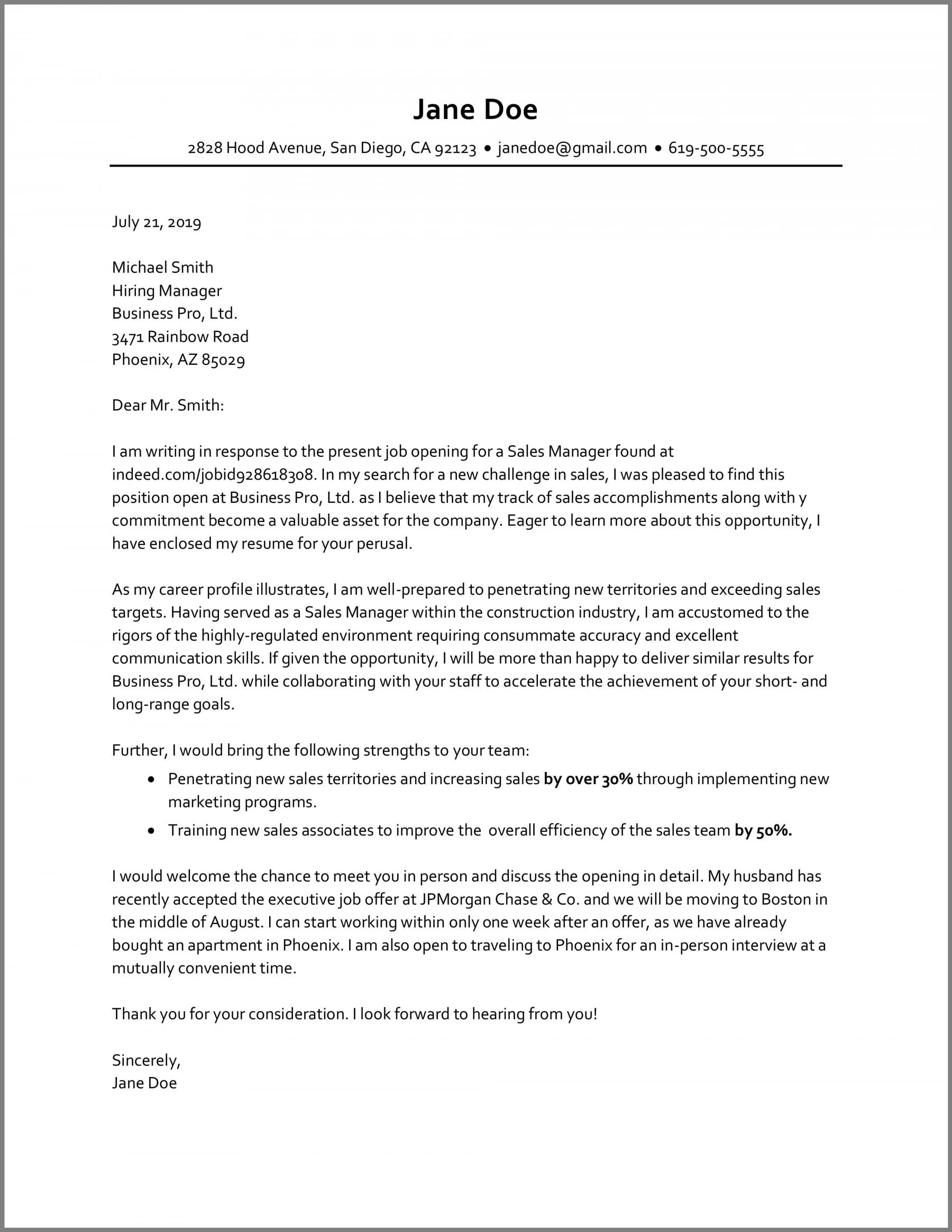
Your cover letter is your chance to sell yourself. Emphasize why you’re a good fit for the role and the company. Mention specific skills and experiences that align with the job description. Show, don’t just tell; provide concrete examples of your achievements and how they relate to the position. Briefly explain why you’re excited about the opportunity. Is it the company culture, the specific projects you’d be working on, or the chance to advance your career? Demonstrating genuine enthusiasm and making a clear connection between your qualifications and the employer’s needs are key to capturing their attention.
Showcasing Your Research and Enthusiasm
Demonstrating that you’ve done your homework is essential. Mention specific aspects of the company, its products or services, its mission, or its recent achievements that resonate with you. This shows you’re not just applying for any job; you specifically want to work there. Discuss what excites you about the role and why you’re particularly interested in living in the new location. Research the area, the cost of living, and the local culture. Show that you understand the area and have a plan. The more detail you can provide, the more convincingly you’ll communicate your genuine interest.
Crafting the Perfect Relocating Cover Letter
Contact Information and Salutation
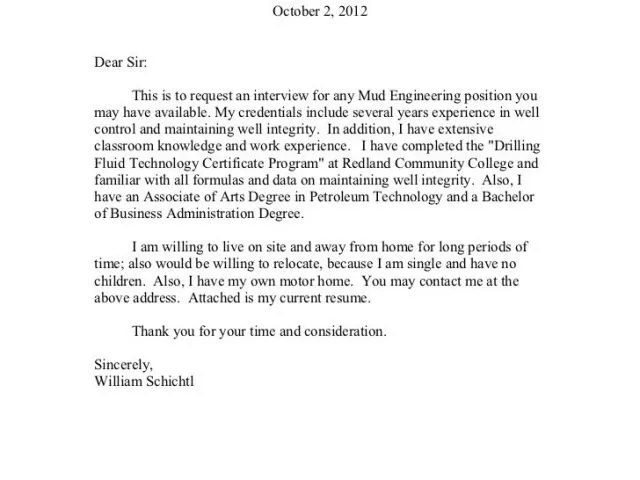
Start with your contact information, including your full name, phone number, email address, and LinkedIn profile URL. Use a professional salutation. If you know the hiring manager’s name, address them directly (e.g., “Dear Mr./Ms. [Last Name]”). If not, use a general salutation such as “Dear Hiring Manager” or “Dear [Company Name] Hiring Team.” This personalized touch makes a positive first impression.
Stating Your Intention and Purpose
Clearly state your intention to relocate in the opening paragraph. Mention the position you’re applying for and, if possible, how you learned about the opportunity. Immediately address the fact that you’re relocating. Keep it concise and focused, setting the stage for the rest of your letter. This upfront approach reassures the employer and prevents any doubt or delay in considering your application.
Emphasizing Your Skills and Qualifications
Highlight your key skills and experiences that match the job requirements. Use action verbs to describe your accomplishments and quantify your achievements whenever possible. Provide specific examples of your past successes, demonstrating your ability to perform the job effectively. Tailor your qualifications to the specific job description, emphasizing the skills and experiences that are most relevant to the role and the company’s needs. This ensures your qualifications are easily and quickly recognized.
Addressing the Relocation Aspect
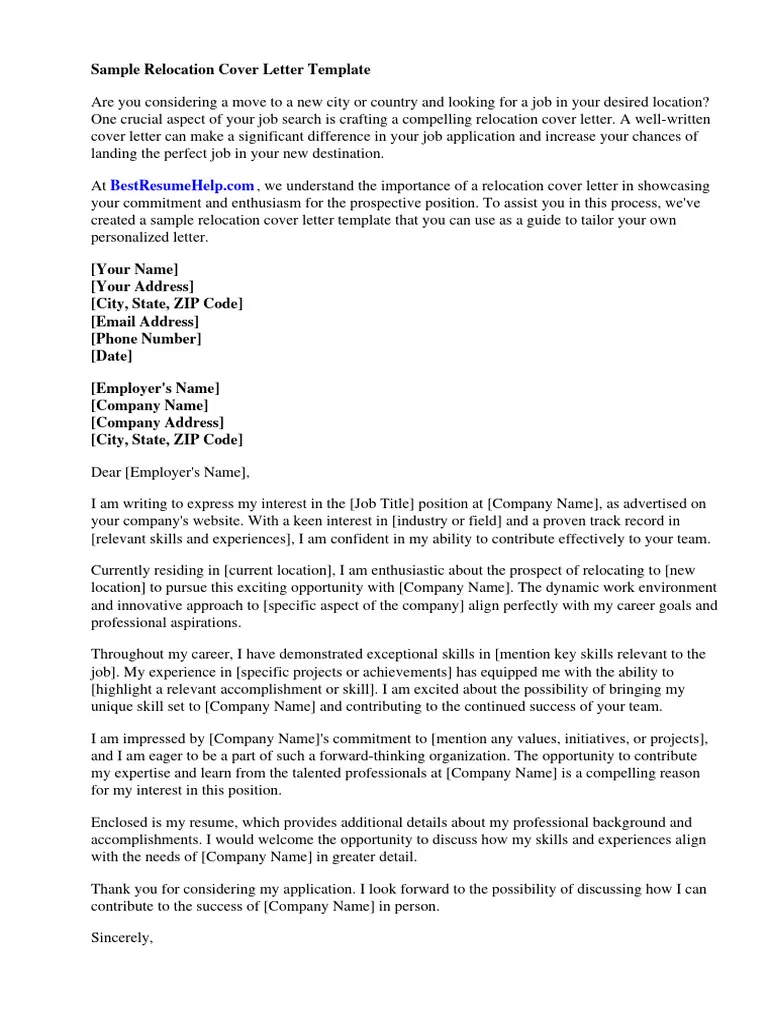
Clearly state your relocation plans and timeline. Specify when you intend to move and when you will be available to start work. Be as specific as possible, providing a realistic timeframe. Reassure the employer that you are committed to the move and have a plan in place. Mention any steps you have already taken to facilitate your relocation. If you have family or other ties, mentioning them could provide further context without getting too personal. Showing that you’ve thought through the logistics can ease the employer’s concerns.
Demonstrating Your Research and Interest
Show the employer that you are serious about the opportunity. Mention specific aspects of the company that appeal to you or any research you’ve done on the company’s culture, products, or services. Discuss why you’re interested in the specific location. Have you visited the area, or do you know people there? Express enthusiasm for both the job and the new location. Showing that you’ve considered the company and the local area demonstrates your dedication and increases the likelihood of an interview.
Closing Your Letter with Confidence
In your closing paragraph, reiterate your interest in the position and your willingness to discuss your qualifications further. Thank the hiring manager for their time and consideration. Include a call to action, such as, “I am eager to discuss how my skills can contribute to your team. I look forward to hearing from you soon.” Offer to provide additional information, and always end with a professional closing, such as “Sincerely” or “Best regards,” followed by your name.
Formatting and Presentation Tips
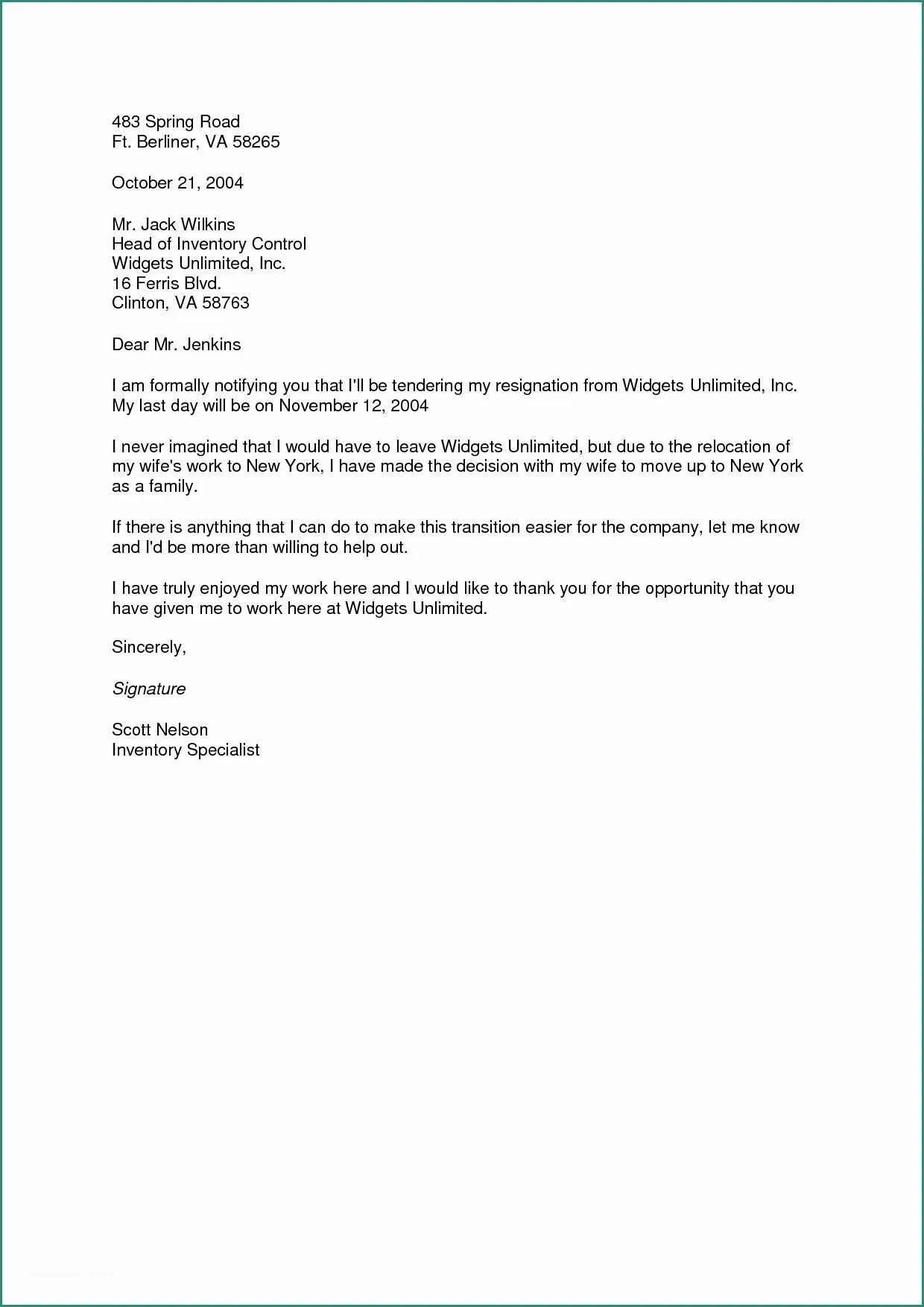
Ensuring Clarity and Professionalism
Keep your cover letter concise and easy to read, ideally one page. Use a standard, professional font like Times New Roman, Arial, or Calibri. Use clear headings and bullet points to break up the text and make it more digestible. Proofread carefully for any grammatical errors or typos, as these can damage your credibility. Ensure a professional tone throughout. Maintain a positive and enthusiastic attitude, and always be respectful.
Proofreading and Editing Your Letter
Proofread your cover letter multiple times. Check for spelling errors, grammatical mistakes, and punctuation errors. Have a friend or family member review your letter for clarity and accuracy. Ensure that your letter flows logically and that your points are easy to understand. A polished, error-free cover letter is essential for making a professional impression, so it is worth the extra effort.
Common Mistakes to Avoid in Relocating Cover Letters
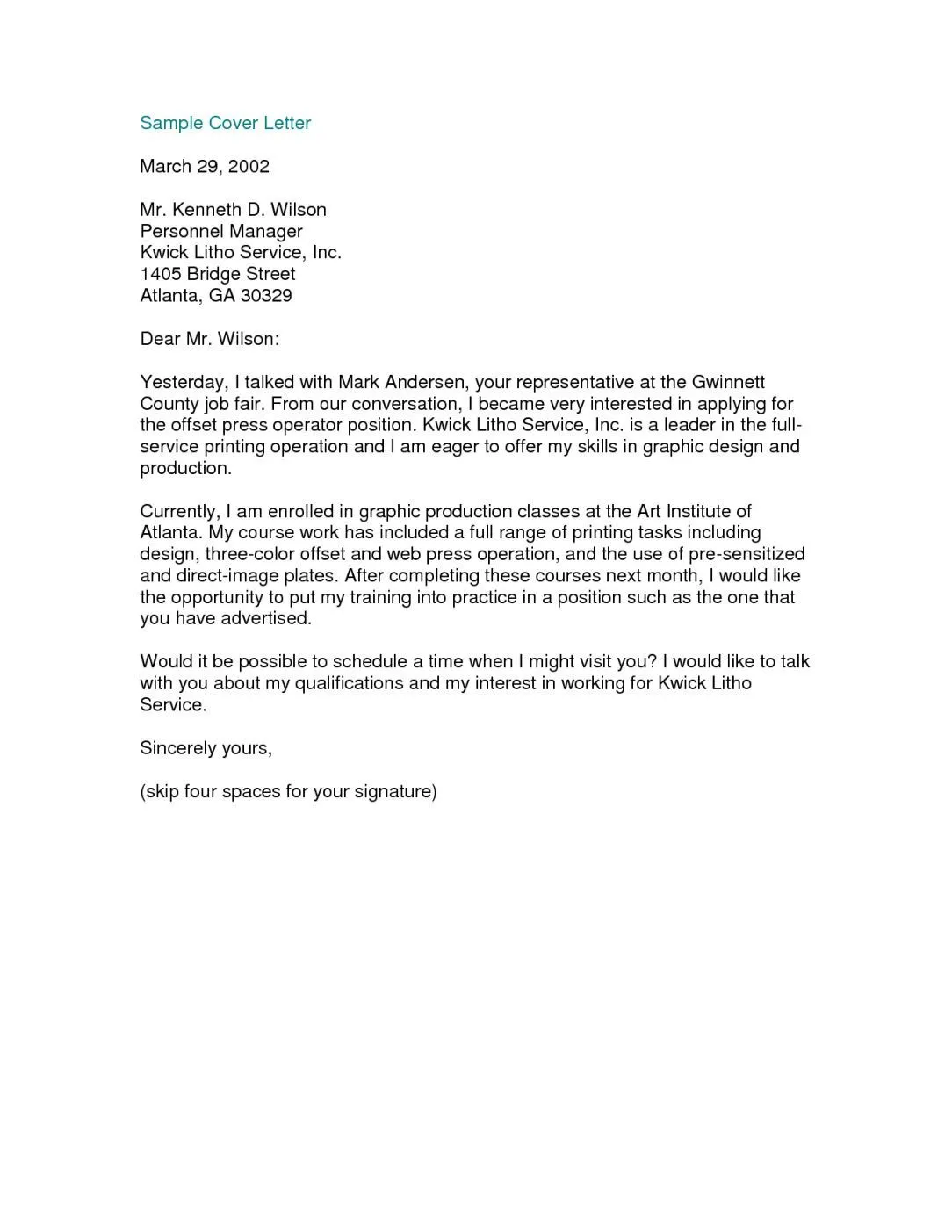
Ignoring the Relocation Factor
The most common mistake is failing to address the relocation directly. Do not assume that the employer will overlook the fact that you live far away. Ignoring this key aspect will likely lead to your application being rejected. You must proactively inform the hiring manager that you’re planning to relocate and give the details of your planned move. This assures them that you have thought through this significant aspect of the role.
Focusing Too Much on Personal Circumstances
While it’s important to mention your relocation plans, avoid including excessive personal details, such as the reasons for your move. Keep the focus on your qualifications and how they match the job requirements. It is more important to show your value to the company. Personal stories are best shared in a follow-up interview, if relevant. Keep it concise and tailored to the job description.
Neglecting to Research the Company
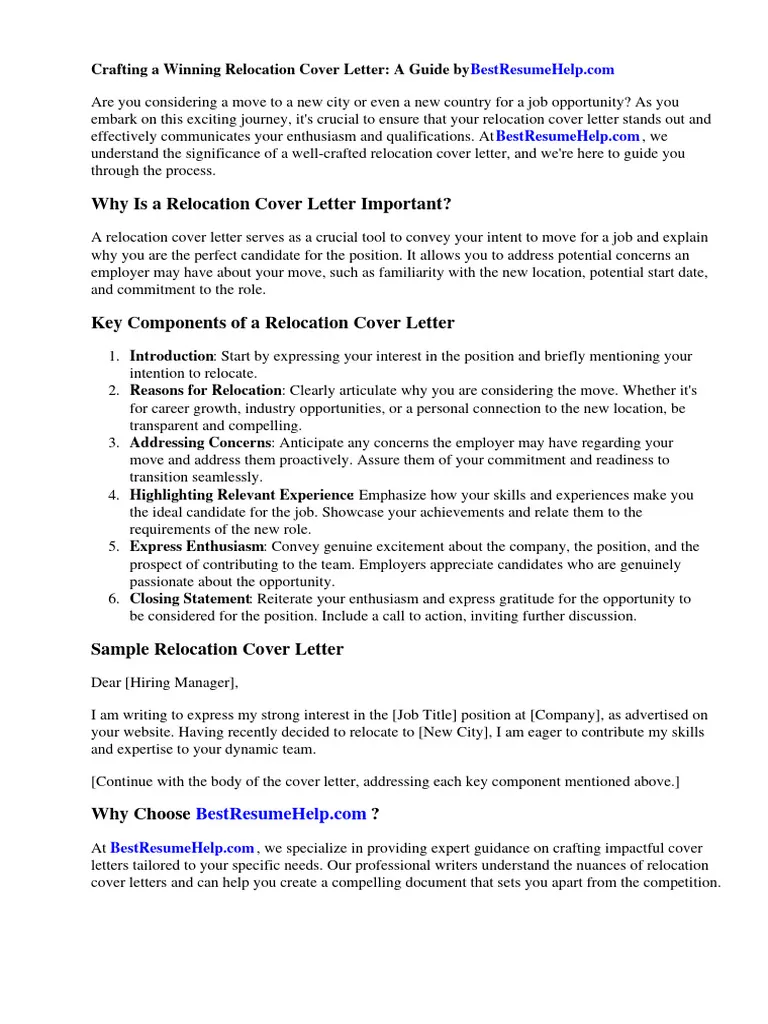
Applying without thoroughly researching the company is a missed opportunity. It shows a lack of genuine interest in the position. Showing that you’ve done your homework by mentioning the company’s products, services, or recent achievements is essential. Customize each cover letter to reflect your understanding of the company’s needs. This personalization shows that you’re serious about the job, increasing the chances of your application standing out.
Using a Generic Cover Letter
Do not reuse the same cover letter for different jobs. Generic cover letters are easily spotted by employers and often lead to an immediate rejection. Tailor each letter to the specific job and company. Customize your letter to highlight the skills and experiences most relevant to each position. This level of personalization shows that you care enough to take the time to match your skills to their needs. This detail significantly boosts your chances of getting an interview.
Relocating Cover Letter Examples and Samples
Reviewing examples can help you gain a better understanding of what a successful relocating cover letter looks like. Here are some examples you can use as a starting point, but be sure to adapt them to your specific situation. The main idea is to show your adaptability and willingness to take the next step in your career.
Example 1 Entry-Level Candidate
For entry-level candidates, the letter should focus on transferable skills and enthusiasm for learning. Highlight relevant coursework, internships, or volunteer experiences. Address any concerns about lack of experience. Show your eagerness to contribute and grow within the company. Demonstrate your ability to learn quickly and a willingness to adapt to new challenges. Emphasize any location-specific experience or interest.
Example 2 Experienced Professional
Experienced professionals should emphasize accomplishments and quantifiable results. Provide evidence of past successes and highlight relevant skills. Tailor your letter to showcase how your experience aligns with the company’s needs. Include your value proposition in specific terms. Demonstrate how you can bring immediate value and provide insights into your past successes that directly apply to the new role. Be confident and showcase your experience.
Example 3 Career Changer
Career changers must address their shift in career paths and highlight transferable skills. Explain your reasons for making a career change and show how your skills are applicable to the new role. Focus on any relevant skills that can carry over. Emphasize your adaptability and willingness to learn. Frame the career change as a strategic move. Highlight any relevant training or courses. Show that you have thought through this change. Show your enthusiasm about this opportunity.
Optimizing Your Relocating Cover Letter for Success
Tailoring Your Letter to Each Job
Customize your letter for each job application. Take the time to read the job description and identify the key requirements. Highlight skills and experiences that match those requirements. Explain why you’re interested in the specific role and the company, showing that you’re a well-rounded candidate, with an active interest in a specific role. Be detailed and show you understand the company’s needs.
Using Action Verbs and Keywords
Use strong action verbs to describe your achievements. This makes your letter more dynamic and engaging. Review the job description for keywords. Incorporate these keywords naturally throughout your letter to ensure that your application gets noticed by both the hiring manager and any applicant tracking systems. This strategic approach is critical for optimizing your letter for the review process.
Highlighting Transferable Skills
Even if you’re changing careers or lacking direct experience, you can highlight transferable skills. These are the skills you’ve acquired in previous roles that are relevant to the new position. Focus on your abilities to adapt, learn, and contribute. Identify those skills that are most valuable to the prospective employer. Explain how your skills translate to success in the new role, bridging any gaps in your experience.
Following Up After Submission
After submitting your cover letter and resume, follow up with the employer within a week or two. This shows your continued interest in the role and reminds the hiring manager of your application. Send a brief, polite email reiterating your interest and inquiring about the status of your application. Thank the hiring manager for their time and consideration. This proactive step often boosts your chances of securing an interview.
